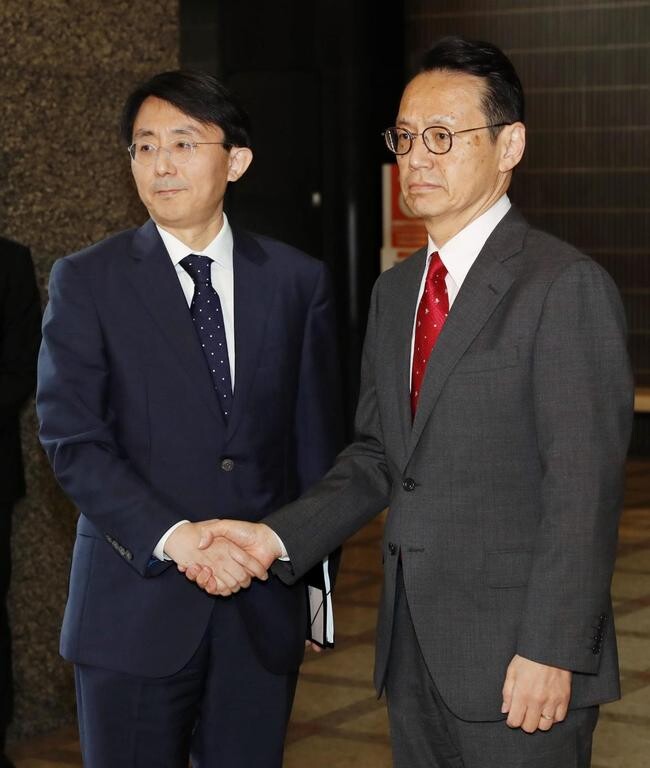hankyoreh
Links to other country sites 다른 나라 사이트 링크
Japan repeats demand to have forced labor ruling deferred to arbitration committee

In South Korea-Japan director-general level diplomatic talks, the Japanese government reiterated its demand that Seoul refer the matter of forced labor conscription during Japan’s colonial occupation of Korea to an arbitration committee.
According to the Nikkei newspaper, the Japanese government made the demand during talks between Kenji Kanasugi, director-general of the Japanese Foreign Ministry's Asian and Oceanian Affairs Bureau, and Kim Jung-han, director-general for Asian and Pacific Affairs at the South Korean Ministry of Foreign Affairs, on June 5. The talks were held at the Japanese Foreign Ministry headquarters in Tokyo and lasted around three hours.
On May 20, the Japanese government demanded an arbitration committee regarding a South Korean Supreme Court ruling instructing Japanese companies to pay compensation to victims of forced labor conscription, arguing that the ruling was in violation of the two sides’ Claims Settlement Agreement. That agreement includes a provision stating that disputes in relation to the agreement may be referred to an arbitration committee with representatives from South Korea, Japan, and a third country. But the arbitration committee cannot be formed if one of the parties refuses. Japanese media reported that South Korea had not given a clear answer in response to Japan’s referral demand.
According to the South Korean Ministry of Affairs, Kim insisted during the meeting that “the intensified seafood inspection measures announced by the Japanese government on May 30 should not be used as a camouflaged discriminatory measure against South Korean seafood.” The Japanese government has been stepping up its inspections of seafood imports, moving on May 30 to double the South Korean flounder inspection rate from 20% to 40% as of June. While the Japanese government insisted that the measure was not intended as retaliation for Japan’s loss in a WTO case regarding South Korea’s ban on seafood imports from Fukushima and surrounding areas, Japanese media read it “essentially as an act of defiance.” Regarding the increased South Korean seafood inspections, Kanasugi was quoted by the NHK network as saying the measure was “intended to prevent food poisoning, not to target any specific country.”
By Cho Ki-weon, Tokyo correspondent
Please direct comments or questions to [english@hani.co.kr]

Editorial・opinion
![[Editorial] Penalties for airing allegations against Korea’s first lady endanger free press [Editorial] Penalties for airing allegations against Korea’s first lady endanger free press](https://flexible.img.hani.co.kr/flexible/normal/500/300/imgdb/original/2024/0502/1817146398095106.jpg) [Editorial] Penalties for airing allegations against Korea’s first lady endanger free press
[Editorial] Penalties for airing allegations against Korea’s first lady endanger free press![[Editorial] Yoon must halt procurement of SM-3 interceptor missiles [Editorial] Yoon must halt procurement of SM-3 interceptor missiles](https://flexible.img.hani.co.kr/flexible/normal/500/300/imgdb/child/2024/0501/17145495551605_1717145495195344.jpg) [Editorial] Yoon must halt procurement of SM-3 interceptor missiles
[Editorial] Yoon must halt procurement of SM-3 interceptor missiles- [Guest essay] Maybe Korea’s rapid population decline is an opportunity, not a crisis
- [Column] Can Yoon steer diplomacy with Russia, China back on track?
- [Column] Season 2 of special prosecutor probe may be coming to Korea soon
- [Column] Park Geun-hye déjà vu in Yoon Suk-yeol
- [Editorial] New weight of N. Korea’s nuclear threats makes dialogue all the more urgent
- [Guest essay] The real reason Korea’s new right wants to dub Rhee a founding father
- [Column] ‘Choson’: Is it time we start referring to N. Korea in its own terms?
- [Editorial] Japan’s rewriting of history with Korea has gone too far
Most viewed articles
- 1[Editorial] Penalties for airing allegations against Korea’s first lady endanger free press
- 2Months and months of overdue wages are pushing migrant workers in Korea into debt
- 360% of young Koreans see no need to have kids after marriage
- 4In rejecting statute of limitations defense in massacre case, Korean court faces up to Vietnam War a
- 5Historic court ruling recognizes Korean state culpability for massacre in Vietnam
- 6“Those souls can rest now”: Vietnam massacre survivor reacts to Korean court win
- 7Bills for Itaewon crush inquiry, special counsel probe into Marine’s death pass National Assembly
- 8[Reporter’s notebook] In Min’s world, she’s the artist — and NewJeans is her art
- 9[Editorial] Verdict on Korea’s massacre in Vietnam a first step in atonement
- 101 in 3 S. Korean security experts support nuclear armament, CSIS finds